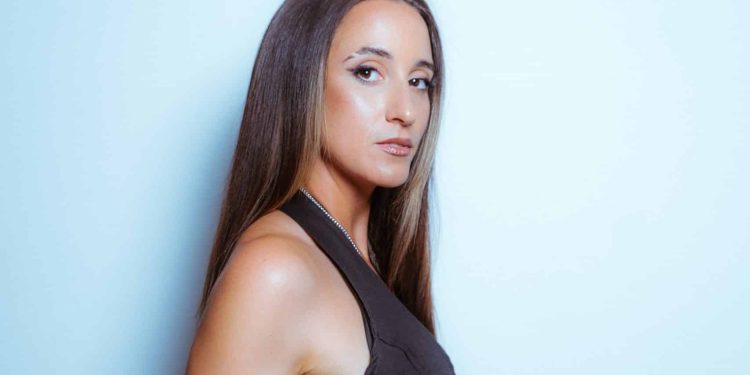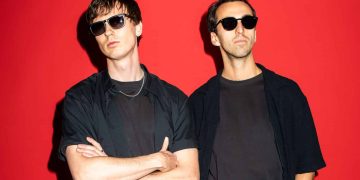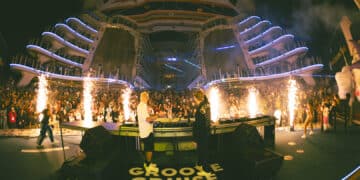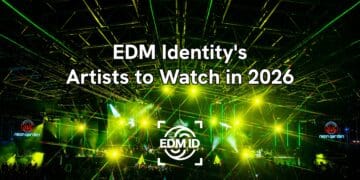Midnight Mass is an innovative and introspective album, and its live tour perfectly complements its emotional depth.
Will Clarke’s Midnight Mass Tour elevates his eponymous album to new heights, a delicate feat masterfully accomplished. Will’s charisma and energy on stage make apparent his passion and connection to each track fused together before your eyes. With ardent support from his team, the Grammy-nominated songwriter infused his creativity into all facets of his live performance.
Halfway through a six-stop tour, the former Detroit native returned to a familiar and sentimental venue. Blanketed amidst one of Detroit’s first evenings of snowfall, fans flocked to Magic Stick seeking a communal musical experience.
Before his performance, we sat in the warm green room to discuss the album, live touring, and more. Cue up Midnight Mass and read on for a window into the mind of Will Clarke.
Stream Will Clarke – Midnight Mass on Spotify
As a former resident of Detroit, how does it feel to come back and host a live tour stop at the Magic Stick?
I lived here for about six years, so it’s always special to come back because I love this city. The fact that it snowed today is amazing. It’s like the icing on the cake. That’s the beauty of Detroit.
What inspired you to release your first album at this point in your career?
I grew up listening to Chemical Brothers, Faithless, and Moby. I was influenced by them and always wanted to do an album, but I didn’t feel I was good enough to write the music. After getting back to DJing after COVID, my manager Ryan and I were very fortunate that we had a really strong “All Night Long” tour booked for a bunch of shows, and things started growing from there.
I wrote almost every day during COVID, chasing club records, and I got to the point where I was slightly bored because it wasn’t exactly what I wanted to do. That’s when I knew it was time to write a bigger body of music. I started the album process in April 2022 and gave myself a year to write nonstop. From April to August 2023 we finished all the details and signed it. So yeah, it’s been a long process. But for me, it was the right time to sit down and write a complete body of music.
Were you bored in the sense that you felt constrained by specific production techniques or templates you needed to use for your club records to receive commercial success?
It was more so the way club records are released now: You write a record and try to get a bunch of DJs to play it. If a bunch of DJs play it, you know it’s going to do well. But if a bunch of DJs aren’t playing it, it’s probably not going to do that well. Then you put the record out and have about two weeks for it to do well. If it doesn’t do well in those first two weeks, maybe you have a month, but then it’s on to the next record. It becomes a rat race, and you’re just chasing, chasing, chasing. For me, having an album that allows people to go back to something cohesive and works together is way more fulfilling.
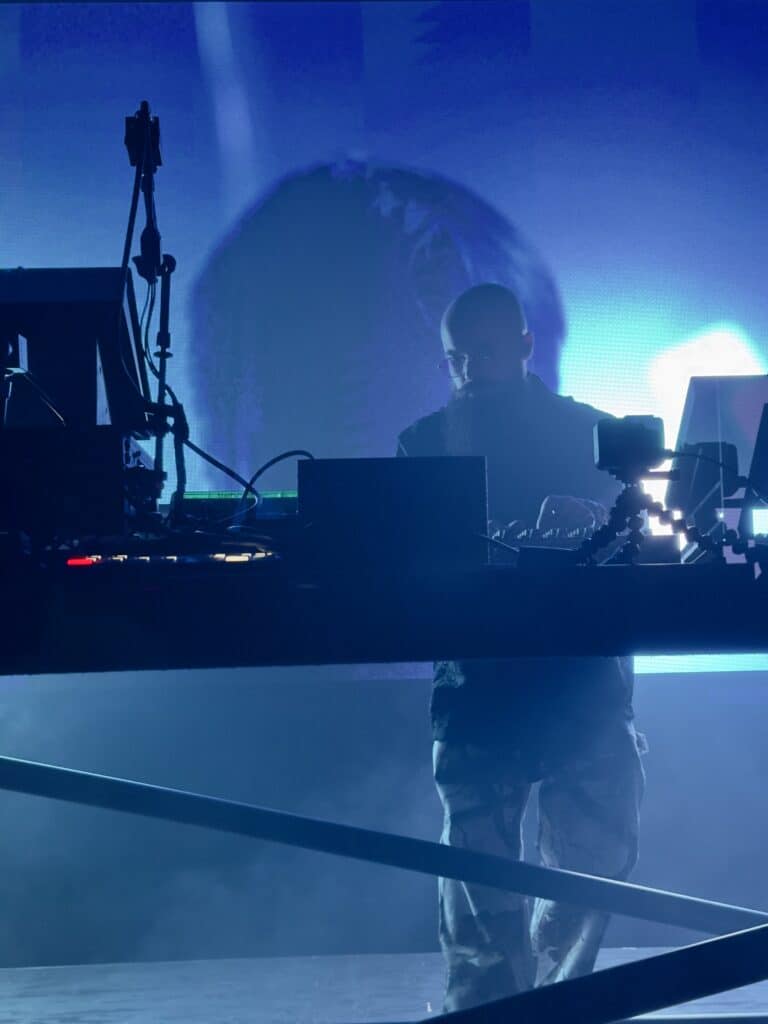
Even after over a decade of associating with bouncy, gritty club music, you’re now associated with this refreshingly introspective and emotional body of work: Midnight Mass. The title is brilliant and befitting, by the way. How did you land on that name for the release?
We’d literally just finished two weekends at Coachella and were absolutely hanging on our way to get Sichuan chicken. I was driving, and Ryan was working through emails on his laptop. He said, “Will, you’ve got to come up with a name for this album,” and we just started throwing out words. Ryan came up with “mass,” and at first, I thought it was a bit too religious. But obviously, I’ve had some sort of “religion” based around my music for a long time. When we came up with “midnight mass,” I knew it was good.
After dedicating yourself to that full year of writing, I’m sure you ended up with an extensive portfolio. Listening to the album in order makes the progression feel tactful and deliberate. What was your process for selecting the tracks best suited for Midnight Mass and their sequence?
We started with thirty, forty, or fifty records to work out. There were certain records like “Summit,” “Need Some Time,” “Weekend Love, and “Burn This City” that were the pillars. The minute I wrote “Summit,” I knew it was going to be track number one. That’s just how I felt when I heard it. I said to myself, “What a great opener.” I knew the first track had to be something different, something that nobody’s ever heard from me, but still sounds like me. We still have the gospel-style vocal. We still have my drums. But it’s not four on the floor. Then “Pray” happened, and it worked, too, so it went on like that.
When all the records were finished, I worked quite closely with Mitch Jones to put them together. Mitch and I first sat down with about twenty records before Ryan and I worked on the records we really liked in a studio in LA. Then, I went away by myself with the final tracks and put them in order.
I interpreted the album as an exploration of the varying stages of grief. Was the album inspired by grief or other specific experiences?
It wasn’t specifically written about grief, but there are certain records that go through all of the stages. And there are certain records I wrote about things that I don’t talk about. I wrote the album to evoke emotion. I wanted to get people on the dancefloor, people driving their cars, people doing their dishes, people dancing around the lounge with their loved ones, that was it for me. I want each record to hold a different memory for everyone.
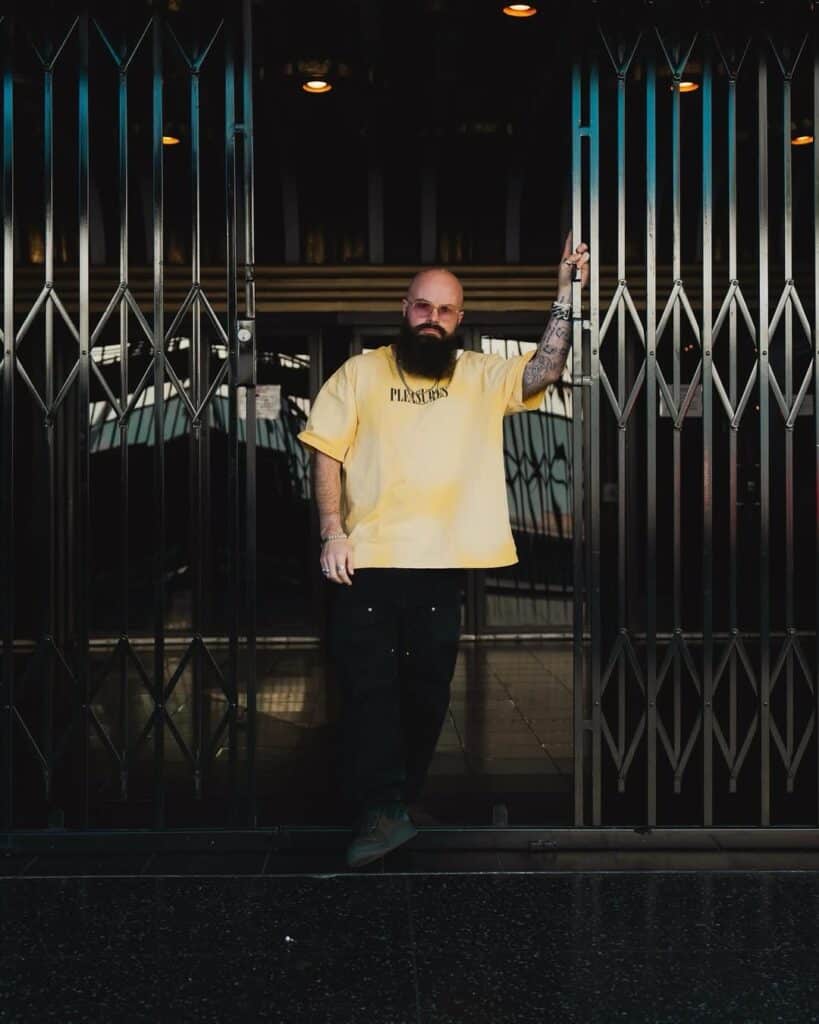
Now that you’ve had the experience of playing a few live shows versus hundreds of DJ sets, what are the most noticeable differences in preparation and performance?
My biggest thing was, “How can I differ from my DJ sets? What do bands do?” Those performances aren’t continuous. They have guitar changes, different vocalists, and things like that. So the biggest difference is that I stop between records and let it breathe. Since we’re doing a live show, there are live drum machines, live acid machines, and live pads. The vocals aren’t live, but Sammy Chattery added specific vocals for the start, middle, and end of the live journey. If the set was continuous, somebody who wasn’t understanding would literally be in a corner saying, “Oh, this is just another day, another DJ.” There is also a massive visual aspect to a live show. We worked in London with film producer Steven Agnew and got some really epic shots to sync with the music.
So, you were deeply involved in all creative aspects of the album and tour, not just the music.
I’ve been involved from day one of working on the album into the set tonight. There hasn’t been a single day where I wasn’t involved.
Social media loved the crafty way you announced your first live tour — it had many of us fooled. Was your decision to “retire from DJing” and shift into a live show directly inspired by the album?
Yeah, I didn’t want to perform Midnight Mass as a DJ. There are so many different tempos that it’s gonna sound “janky,” and it’s not gonna work. It’s not going to feel right. There’s so much emotion behind this album that you need to be with the collective crowd and see all the little details. The live show isn’t only tracks from the album, there are also a couple of my popular records that people love to hear. I’m offering different versions of my core sound highlighting different parts of those records that they would have never heard before.
Follow Will Clarke:
Website | Facebook | X | Instagram | SoundCloud | YouTube | TikTok



